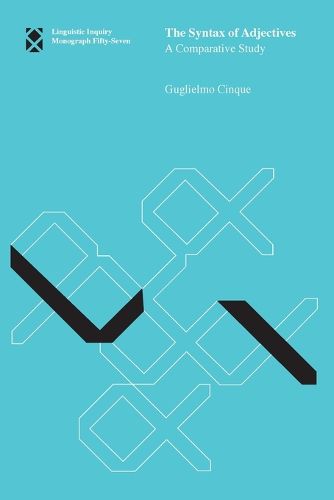Readings Newsletter
Become a Readings Member to make your shopping experience even easier.
Sign in or sign up for free!
You’re not far away from qualifying for FREE standard shipping within Australia
You’ve qualified for FREE standard shipping within Australia
The cart is loading…






In The Syntax of Adjectives, Guglielmo Cinque offers cross-linguistic evidence that adjectives have two sources. Arguing against the standard view, and reconsidering his own earlier analysis, Cinque proposes that adjectives enter the nominal phase either as adverbial modifiers to the noun or as predicates of reduced relative clauses. Some of his evidence comes from a systematic comparison between Romance and Germanic languages. These two language families differ with respect to the canonical position taken by adjectives, which is prenominal in Germanic and both pre- and postnominal in Romance. Cinque shows that a simple N(oun)-raising analysis encounters a number of problems, the primary one of which is its inability to express a fundamental generalization governing the interpretation of pre- and postnominal adjectives in the two language families. Cinque argues that N-raising as such should be abandoned in favor of XP-raising–a conclusion also supported by evidence from other language families. After developing this framework for analyzing the syntax of adjectives, Cinque applies it to the syntax of English and Italian adjectives. An appendix offers a brief discussion of other languages that appear to distinguish overtly between the two sources of adjectives.
$9.00 standard shipping within Australia
FREE standard shipping within Australia for orders over $100.00
Express & International shipping calculated at checkout
Stock availability can be subject to change without notice. We recommend calling the shop or contacting our online team to check availability of low stock items. Please see our Shopping Online page for more details.
In The Syntax of Adjectives, Guglielmo Cinque offers cross-linguistic evidence that adjectives have two sources. Arguing against the standard view, and reconsidering his own earlier analysis, Cinque proposes that adjectives enter the nominal phase either as adverbial modifiers to the noun or as predicates of reduced relative clauses. Some of his evidence comes from a systematic comparison between Romance and Germanic languages. These two language families differ with respect to the canonical position taken by adjectives, which is prenominal in Germanic and both pre- and postnominal in Romance. Cinque shows that a simple N(oun)-raising analysis encounters a number of problems, the primary one of which is its inability to express a fundamental generalization governing the interpretation of pre- and postnominal adjectives in the two language families. Cinque argues that N-raising as such should be abandoned in favor of XP-raising–a conclusion also supported by evidence from other language families. After developing this framework for analyzing the syntax of adjectives, Cinque applies it to the syntax of English and Italian adjectives. An appendix offers a brief discussion of other languages that appear to distinguish overtly between the two sources of adjectives.